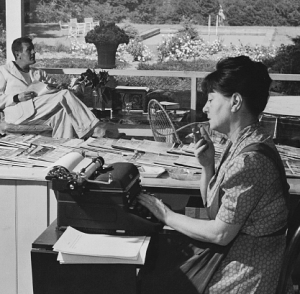High school juniors are currently struggling with college application essays. Nobody enjoys writing to begin with. If anybody did enjoy writing, that person would not be an adolescent effervescing over the crafting of a personal statements for admissions and in the extraordinarily unlikely eventuality that anybody enjoyed writing personal statements, that anybody would not be a sensitive 17-year-old, hoping to differentiate herself from legions of other applicants all of whom have–apparently–cured cancer while discovering extra-terrestrial planets.
Dorothy Parker said, “I hate writing; I love having written.“ Hemingway was more emphatic. “Writing is easy,” he said. “All you have to do is sit down at the typewriter and bleed.”

But at least Dorothy and Ernest were famous and had editors. They had a sense of who their readers might be and could write whatever they chose. Adolescents writing the personal statement suffer exponentially—trying to make their un-exceptional selves seem extraordinary and worthy. Students envision readers of biblical proportions, bearded literature PhDs viciously looking for grammatical imperfections and faulty pronoun references like hawks scanning the forest floor for terrified mice or voles. (The reality is that readers are actually recent college graduates in their mid-20s, earning a few dollars for a few years before applying to graduate schools themselves or leaving academia for “real“ jobs. Tenured university professors seldom condescend to read admissions essays.)

So I help my students understand that a personal statement should be just that—personal. Extra credit for insight, gentle humor, and understanding. No reason to pontificate about scoring the winning touchdown or losing the student council election or getting the yearbook published on time or how the world is a significantly better place as a result of their having spent a week in a country with poor Internet connectivity.

But before I break my arm patting myself on the back with my prodigious understanding of the makings of strong essays, let’s go back 14 years and 529 of these weekly columns. I was having lunch with one of my running buddies. Over salmon burgers, he encouraged me to write up some vignettes. “After 30 years of counseling,” he said, “you can share helpful guidance.” He reached over and helped himself to one of my sweet potato fries. “And it’ll be good for business too.” Great idea, I thought. I’ll get right on it.
Three months later, my running buddy and I shared another meal. He asked how my blog was coming along. “I’m almost through with the first paragraph,” I replied.
Progressing at the steady pace of five or ten words per week, I sent out my first 750-word essay after three years of obsessing and revising.
That was 529 columns ago. Now, I love writing these. It takes me about two hours each week to compose a blog post. As opposed to three years of inefficient agony. Frequently, I have so much to share, so much that I want to communicate about parenting, learning differences, admissions, or substance use, that I write two in a week.
I communicate to my students what my running buddy and I talked about: Don’t get it right, just get it written and perfect is the enemy of good. My students are effusive and gracious in their thanks. I never could’ve done this without you. It feels great to be done. I have to pay it backward.: My running buddy from that series of meals all those years ago? You can reach him here. He may have some ideas that can help you accomplish that project you never thought you had the insight or the follow through to do.

If he can inspire me to create 529 blogs over the course of ten years, there’s no telling what the two of you might accomplish together.


